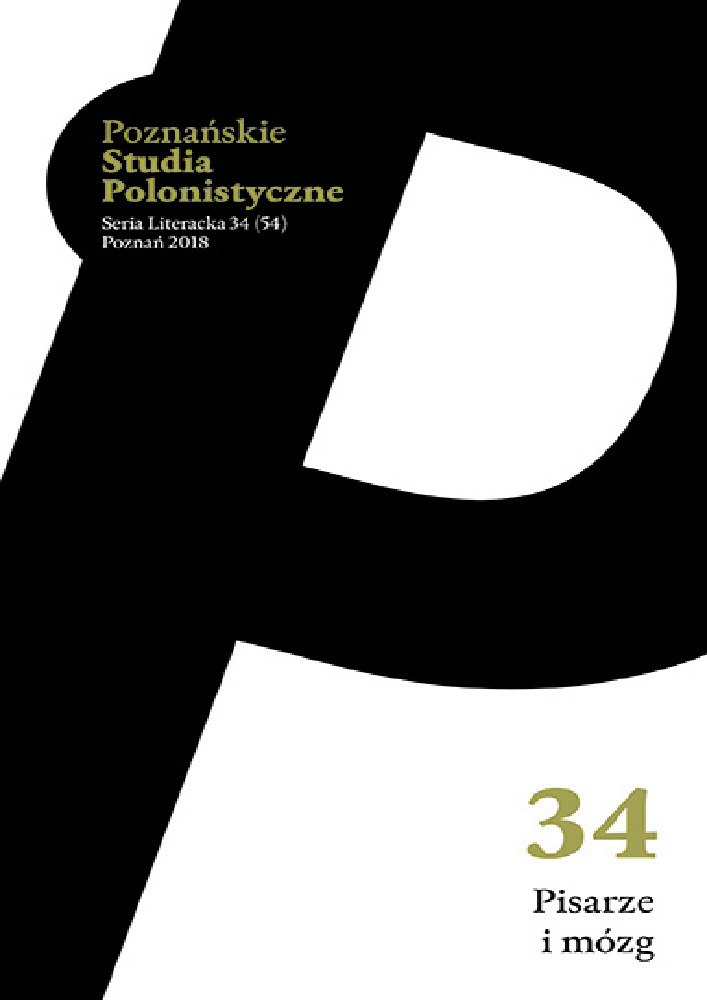Abstrakt
In the text, I address the subject of neurocognitive science, art and literature in various perspectives, whose connecting point is the perspective of the experiencing subject and her embodiment. The embodied and involved subject reveals through her ailments and suffering dimensions of experience not always visible in the state of health and well-being. The starting point of my deliberations are issues in the field of neurocognitive science and neuroesthetics as the areas that attempt to explain the neurobiological mechanisms of perception of art and literature. Next, I refer to research in the field of neuroanthropology, through which the positive and creative dimensions of the illness experience are noticed. I also refer to psychopathology as an area that shows the dimensions of human experience in a much more fundamental way than it is able to show the experience of everyday life.
Bibliografia
Armstrong Paul B. (2013), How Literature Plays with the Brain. The Neuroscience of Reading and Art, Johns Hopkins University Press, Baltimore [USA].
Choudhury Suparna, Slaby Jan (2012), Critical Neuroscience: A Handbook of the Social and Cultural Contexts of Neuroscience, Wiley-Blackwell, Malden [USA].
Dehaene Stanislas (2009), Reading in the Brain: The Science and Evolution of a Human Invention, Viking, New York [USA].
Domínguez Juan F. (2012), Neuroanthropology and the dialectical imperative, „Anthropological Theory”, vol. 12, s. 5-27.
Fuchs Thomas (2002a), Mind, Meaning and the Brain, „Philosophy, Psychiatry & Psychology”, vol. 9, nr 3, s. 261-264.
Fuchs Thomas (2002b), The Challenge of Neuroscience. Psychiatry and Phenomenology Today, „Psychopathology”, nr 35 (66), s. 319-326.
Fuchs Thomas (2005), Corporealized and Disembodied Minds. A Phenomenological View of the Body in Melancholia and Schizophrenia, „Philosophy, Psychiatry & Psychology”, vol. 12, nr 2, s. 95-107.
Gibbs Raymond W. (2006), Embodiment and Cognitive Science, Cambridge University Press, Cambridge [Wielka Brytania].
Holland Norman (2009), Literature and the Brain, PsyArt Foundation, Gainesville [USA].
Kędra-Kardela Anna (2010), Reading as Interpretation. Towards a Narrative Theory of Fictional World Construction, Wydawnictwo UMCS, Lublin.
Kiverstein Julian (2012), The Meaning of Embodiment, „Topics in Cognitive Science”, vol. 4, s. 740-758.
Myers Anne Laurenzo Neely (2012), Toward an Applied Neuroanthropology of Psychosis. The Interplay of Culture, Brains and Experience, „Annals of
Anthropological Practice”, vol. 36, nr 1, s. 113-130.
Panksepp Jaak (2004), Affective Beuroscience. The Foundations of Human and Animal Emotions, Oxford University Press, New York [USA].
Przybysz Piotr (2014), O poznawaniu innych umysłów. Wokół kognitywistycznych badań nad poznaniem społecznym, Bogucki Wydawnictwo Naukowe, Poznań.
Ratcliffe Matthew (2008), Feelings of Being. Phenomenology, Psychiatry and the Sense of Reality, Oxford University Press, Oxford [Wielka Brytania].
Ratcliffe Matthew (2009), Belonging to the World Through the Feeling Body, „Philosophy, Psychiatry & Psychology”, vol. 16, nr 2, s. 205-211.
Rembowska-Płuciennik Magdalena (2012), Poetyka intersubiektywności. Kognitywistyczna teoria narracji a proza XX wieku, Wydawnictwo Naukowe UMK, Toruń.
Ricoeur Paul (2005), O sobie samym jako innym, przeł. Bogdan Chełstowski, oprac. Małgorzata Kowalska, Wydawnictwo Naukowe PWN, Warszawa.
Rizzolatti Giacomo, Sinigaglia Corrado (2008), Mirrors in the Brain: How Our Minds Share Actions and Emotions, trans. Frances Anderson, Oxford University Press, Oxford [Wielka Brytania].
Rowlands Mark (2010), The New Science of the Mind. From extended cognition to embodied phenomenology, MIT Press, Cambridge [USA].
Sacks, Oliver (1994), Mężczyzna, który pomylił swoją żonę z kapeluszem, przeł. Barbara Linderberg, Wydawnictwo Zysk i S-ka, Poznań.
Sacks Oliver (1995), Antropolog na Marsie, przeł. Piotr Amsterdamski, Wydawnictwo Zysk i S-ka, Poznań.
Sass Louis Arnorsson (1994), Madness and Modernism: Insanity in the Light of Modern Art, Literature, and Thought, Harvard University Press, Harvard [USA].
Zeki Semir (2004), The Neurology of Ambiguity, „Consciousness and Cognition”, nr 13, s. 173-196.
Licencja
Autorzy
Autorzy tekstów przyjętych do publikacji w czasopiśmie „Poznańskie Studia Polonistyczne. Seria Literacka” są zobowiązani do wypełnienia, podpisania i odesłania na adres redakcji umowy o udzielenie nieodpłatnej licencji do utworów, z zobowiązaniem do udzielania sublicencji CC.
Zgodnie z umową, autorzy tekstów opublikowanych w czasopiśmie „Poznańskie Studia Polonistyczne. Seria Literacka” udzielają Uniwersytetowi im. Adama Mickiewicza w Poznaniu niewyłącznej i nieodpłatnej licencji oraz zezwalają na użycie sublicencji Creative Commons Attribution-NoDerivatives 4.0 International (CC BY-ND 4.0).
Autorzy zachowują prawa do dalszego, swobodnego rozporządzania utworem.
Użytkownicy
Zainteresowani użytkownicy internetu uprawnieni są do korzystania z utworów opublikowanych od 2016 roku w „Poznańskich Studiach Polonistycznych. Serii Literackiej” pod następującymi warunkami:
- uznanie autorstwa – obowiązek podania wraz z rozpowszechnionym utworem, informacji, o autorstwie, tytule, źródle (odnośniki do oryginalnego utworu, DOI) oraz samej licencji;
- bez tworzenia utworów zależnych – utwór musi być zachowany w oryginalnej postaci, nie można bez zgody twórcy rozpowszechniać np. tłumaczeń, opracowań.
Do wszystkich tekstów opublikowanych przed 2016 r. prawa autorskie są zastrzeżone.
Inne
Uniwersytet im. Adama Mickiewicza w Poznaniu zachowuje prawo do czasopisma jako całości (układ, forma graficzna, tytuł, projekt okładki, logo itp.).
